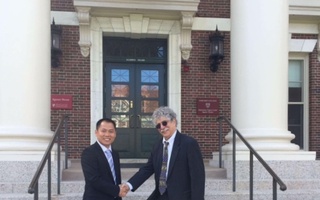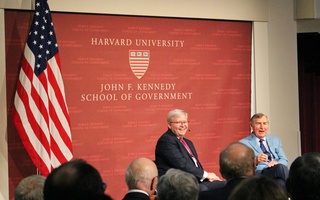The events which have taken place in the People's Republic of China during the last three months have not gone unnoticed among the 178 Chinese nationals currently studying at Harvard, or the thousands of others around the country.
As the pro-democracy movement gathered momentum in Beijing during the month of May, a host of independent Chinese student organizations began to band together at Harvard and other area colleges to register support for the protesters back home.
Students at Harvard and the Massachusetts Institute of Technology (MIT) grouped together this spring to form the May Fourth Foundation, which attempted to raise money to buy word processors and fax machines to send back to students in China. And students from the Boston area founded the China Information Center with the aim of gathering and spreading information about the prodemocracy movement.
During the month of May, student organizations were responsible for a wave of protests and demonstrations around the Boston area. And when the Chinese government began its brutal crackdown on the Tiananmen square protesters, Harvard students and others organized a rally in Washington D.C.
But six weeks after the Tiananmen Square massacre, many Chinese students say that they need to devote themselves to other types of protest. Rather than directly aiding the protesters back home and openly challenging the government, many of them say they now need to challenge the regime of Li Peng and Deng Xiaoping in an indirect way, by forcing the American government to put pressure on China.
But although students here support the prodemocracy movement and condemn the actions of the Chinese government, many say that they are not certain what measures they should take.
"We're sort of thinking and discussing right now," says Zhao Haiching, a post-doctoral student in biochemistry. "How should we move? We haven't decided yet."
"What do we want the U.S. government to do?" he asks. "We're not quite sure about that."
Part of the problem, explains Luo Zhexi, a graduate student in zoology, is that the government crackdown has driven many of the student leaders in China underground. In recent weeks, it has become increasingly difficult to send resources to China.
"Before the crackdown, our major difficulty was in sending information back, sending money back, really trying to keep communication open," says Luo. But in recent weeks, he adds, police have been keeping a close watch on every telephone and fax machine.
And the Chinese government, never known for its receptiveness to criticism, has become increasingly closed in recent weeks, Luo says. "After the massacre, the situation worsened," he says. "The Chinese government pretty much refused to listen to what we wanted to say."
As a result, students say they are trying to move beyond the demonstrations and support movements that they began with.
"Now people are thinking `maybe that's not the only way to support the pro-democracy movement,'" says Yang Zhi. "Now maybe we have to sit down and start thinking about what we can do.
"We recognized that in the democracy movement, the center had to move outside China, and that we should take the initiative," says Luo.
Consequently, many students have turned their attention to the federal government. Many of them criticize the Bush Administration for failing to respond adequately to the crackdown. Although President Bush suspended military aid to China a few days after the massacre, several students feel the U.S. could be doing more to bring pressure to bear on the Chinese government.
"So far the attitude of the Bush Administration has been pretty disappointing," says Ye Yang, a graduate student in comparative literature. "It might be a game on his part. Let the Congress and the Senate play the militant role."
Ye, a member of the independent Chinese Students Association that was formed at Harvard in response to the pro-democracy movement, has been working to get the United States to adopt economic sanctions against the Chinese government.
Although he maintains that sanctions have the support of most of the Chinese students in the Boston area, Ye acknowledges that such measures are highly controversial. But he avidly maintains that the U.S. has no other effective means at its disposal.
"Economic sanctions are the thing that they are afraid of most," says Ye. "And the country that they care about most is still the United States."
The U.S. is currently China's third largest trading partner--after Hong Kong and Japan--and American investments there total $3.5 billion.
At a forum on Wednesday sponsored by the Kennedy School of Government's Institute of Politics, Ye listed one by one the arguments used against sanctions and countered them with his own arguments. One popular view is that sanctions would inevitably push China toward the USSR, Ye said.
"This argument is particularly pushed by Richard Nixon," he says. "Who else?."
In fact, Ye points out, China split from the the Soviet Union's camp in the 1950s, and there is little reason to think that an adversarial relationship with the U.S. would make it go back.
Another Nixonesque argument is that economic sanctions would force China to cut itself off from the rest of the world, Yang says, countering that in the modern era, China already has too many ties to other nations to be able to isolate itself.
Frequently heard among Chinese students is the argument that sanctions would only hurt the Chinese people.
"The problem is whether you want them to suffer longer or to suffer shorter," says Ye. There is no getting around the fact that people would be hurt by sanctions, he says. But in the long-term, people will suffer more in a repressive government, he adds.
Another major endeavor of Chinese students relates to the visa problems that many of them face. The overwhelming majority of the 40,000 Chinese students studying in the U.S. are here on so-called "J" visas, which require them to return home on completion of their degrees.
Once they return to China, holders of J visas are ineligible to come back to the U.S. for another two years. And many of them are subject to arrest or worse for their actions in support of the prodemocracy movement here.
Zhao points to the example of Liu Xiaobo, a former graduate student at Harvard who returned to China last month to take part in the demonstrations at Tienanmen Square. Liu was reportedly hustled into a car by a man in plainclothes on June 6, three days after the crackdown began.
An article in the People's Daily described Liu as a "black hand" and criticized him as a "Westerntrained" intellectual, Zhao said.
"We see that as a strong example of how to behave," Zhao says. "We might face the same fate or even worse if we go back."
On Monday, Zhao and Chinese student leaders from other parts of the country met with Senate Majority Leader George Mitchell (D-Maine) to urge a change in the status of Chinese students with J visas.
On Tuesday, the Senate passed 97-0 an amendment to the Immigration and Nationality Act, sponsored by Mitchell and Senate Minority Leader Robert J. Dole (R-Kansas), which would waive the two-year residency requirement and allow students to remain as legal nonimmigrants in the U.S. until June, 1992. A similar measure, sponsored by Rep. Nancy Pelosi (D-Calif.) is currently before the House.
Beyond safeguarding the rights of students, Zhao explains, such a change would also bring important pressure to bear on the Chinese regime.
"Many students can't speak out now without fear because they know they will have trouble when they come back," explains Zhao. "And [the Chinese leaders] know they will come back.
"But say that this is waived. That means that all the J students will have the choice of coming back. Now how to get those students back? The only way for the Chinese government to convince those students to come back is by improving the political situation."
Furthermore, Zhao says, China desperately needs those who are studying abroad if it is to advance economically.
"As long as they want to modernize the country, they can't just keep buying technology," he says. "They need the expertise."
The Chinese government has in the past shown itself extremely unwilling to bow to pressures from outside influences. But many students say that the limited steps that the U.S. has taken have already shown some positive effect. Although the wave of arrests and executions still continues, it is proceeding in a much more low-key style, says Luo.
"They've even tried to hide it a bit when they arrest people," says Luo. "That doesn't solve the problem, but at least we've built up the pressure to the point where they can't just shoot people straight out."
And as the crackdown continues, those studying abroad say they may have to be the ones who keep the democracy movement in China alive.
"If the democracy movement is at a low point," says Yang, "we can do it here--use the foreign countries and students as a base for the prodemocracy movement."
Read more in News
The Thesis That Almost Wasn'tRecommended Articles
-
Chinese Students Happy With Executive OrderChinese students at Harvard said they were pleased with President Bush's recent executive order, which will allow them to remain
-
LAST LECTURE ON CHINARev. A. H. Smith of Tientsin, China, will deliver the last of a course of six lectures on "The Present
-
Color Line Cuts Through the HeartJimmy Zhao ’08 says his parents used to joke that if he ever brought a white girl home, at least
-
 Donor Funds Ed School Research on Chinese Academic Stress
Donor Funds Ed School Research on Chinese Academic Stress -
 Former Asst. Defense Secretary Advises Path for U.S.-Chinese Relations
Former Asst. Defense Secretary Advises Path for U.S.-Chinese Relations













